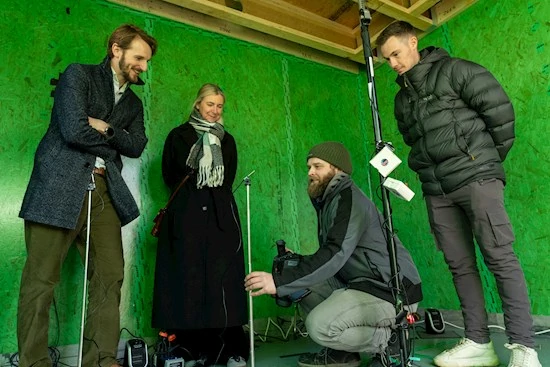The Leeds Sustainability Institute (LSI), part of Leeds Beckett University, is launching two new test cells to baseline the real-world thermal performance of UK homes and further advance its innovation in energy efficiency testing.
The launch of the two test cells at Citu’s Climate Innovation District in Leeds, is part of a wider project by LSI to gather real-world thermal performance data on British house types to allow the evaluation of the effectiveness of new build homes and innovative retrofit solutions.
This work comes at a critical time, with the Future Homes Standard (FHS) set to take effect in 2025. For the first time, developers will be required to test and verify the thermal performance of new homes after construction, ensuring they perform as designed.
These test cells will function as laboratories, enabling the development of more reliable methods for measuring building performance. By improving measurement techniques, housebuilders, landlords, and homebuyers can gain greater confidence that their properties perform as expected and meet modern energy efficiency standards.
Alongside the launch of these new facilities, the LSI has been conducting an extensive building performance testing program at the Net-Zero Research Village (NeRV) near Gateshead. Powered by Northern Gas Networks, NeRV serves as a cutting-edge testing ground for emerging retrofit net-zero technologies.
At NeRV, the LSI team is assessing nine different home types, each representing a typical British housing era—from 1910s terraces and 1930s semi-detached houses to 1950s bungalows, 1970s flats, and 1990s detached homes. Their research will establish baseline thermal performance metrics for each housing type, allowing the evaluation of the effectiveness of innovative retrofit solutions.
The LSI’s research will provide data to improve tools that will help the industry meet its ambitious new build and retrofit targets, and help the industry move away from relying exclusively on models to predict hypothetical improvements.
This is also critical as the UK government is accelerating efforts to retrofit existing homes to meet net-zero targets. To support this, new “pay-by-performance” mechanisms have been introduced in initiatives like the Energy Company Obligation 4 (ECO4) and the Great British Insulation Scheme (GBIS). These programs emphasize the need for accurate measurement tools that can verify real energy savings before and after retrofits.
Professor David Glew, Director of the Leeds Sustainability Institute at Leeds Beckett University, said: “We’re partnering with developer Citu to establish these two test cell sites in Leeds to help define a pathway for housebuilders to integrate measurements into their everyday construction processes and meet upcoming net zero regulations.
“The coming shift in focus within the building regulations towards measured data is a step change for the industry, and we are doing this research to improve and validate the tools industry needs to ensure they will comply with the requirements.
“It is essential for all parts of the construction industry, from housebuilders, landlords and energy companies to green tech and finance innovators, to know the real performance of their energy efficient products and homes.
“Without reliable tools and methods to test and baseline performance, we won’t have the certainty we need to support the net zero transition of our housing stock. The benefits of our research will be transformative, from ensuring that the sector meets its legal responsibilities to hitting energy saving targets and even helping new tech on its journey to adoption.”
Sam Whiteley, Production Manager at Citu, added: “Citu and the Climate Innovation District are driven by creating sustainable urban communities and exploring and incorporating homes built with sustainable materials and innovative technologies.
“So, working with LSI on these two new test cells helps to not only demonstrate our existing credentials but will allow us to continue innovate and drive performance standards in sustainable home building.
“We’re incredibly proud to be part of this wider programme as we all work towards a Net Zero future.”
David Lynch, Energy Transition Strategy Manager at NeRV, said: “The testing LSI have carried out at NeRV will give us granular insights into the baseline energy performance for each property type, ultimately helping us understand what impact low carbon retrofit technologies have had upon each dwelling.
“All of this takes us closer to delivering the data on domestic decarbonisation, and providing the evidence customers need to make informed decisions depending on the type of home they live in.
“With the UK needing to decarbonise 20,000 properties a week for the next 25 years, it’s absolutely essential to have those answers.”



